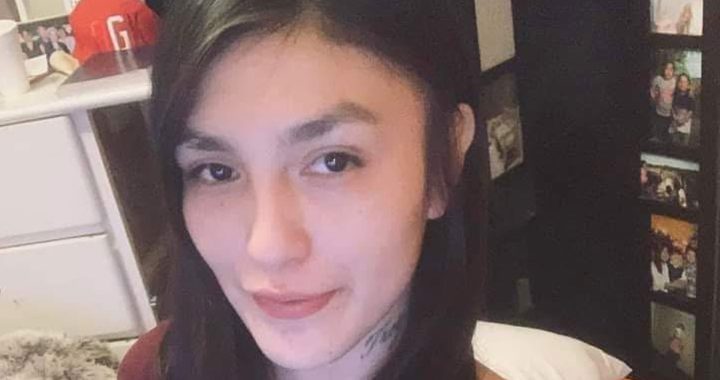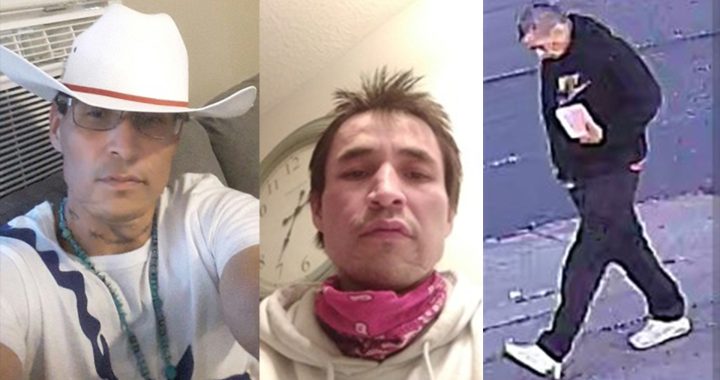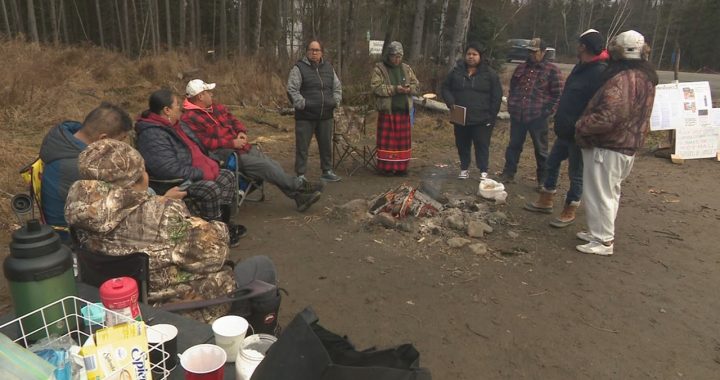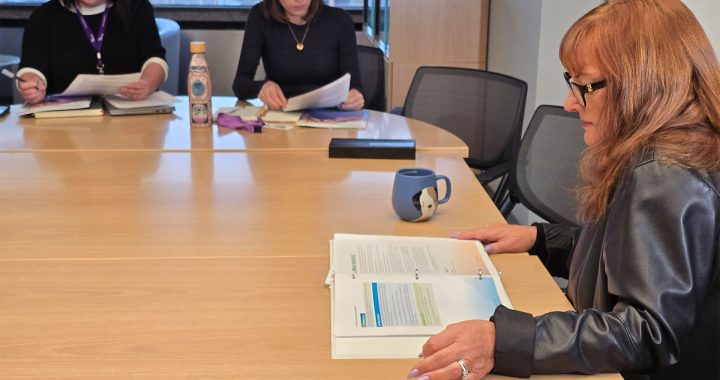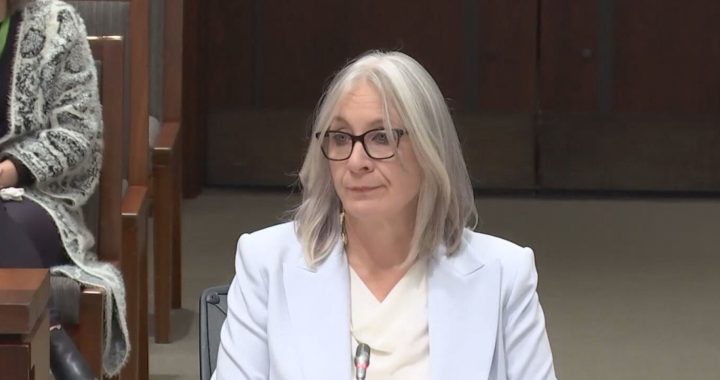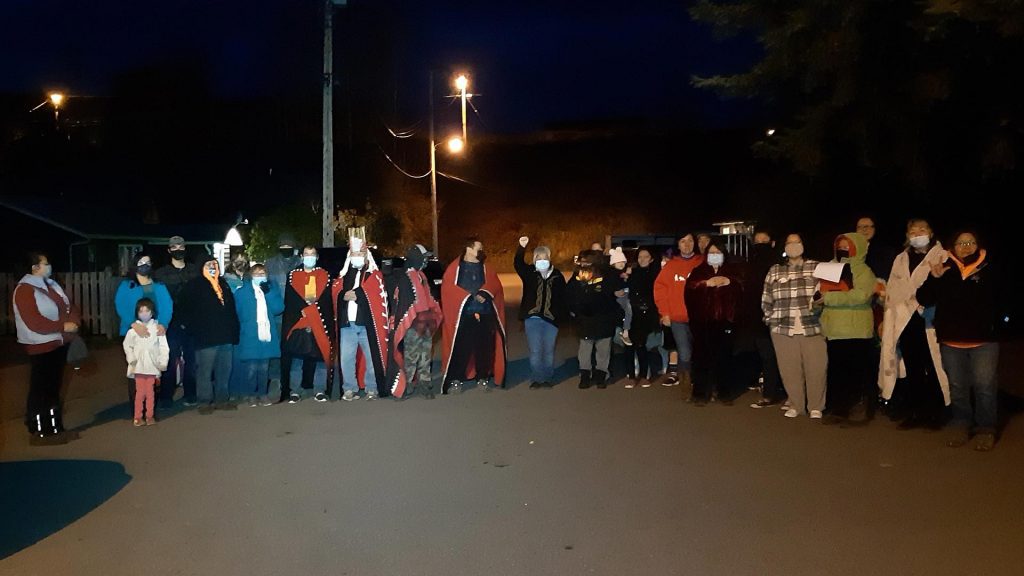
Gitxsan Nation members and allies gather to stop MCFD social workers from taking a child out of the Gitanmaax community and back into care on Oct. 16. Photo provided by Wilp Git'luuhl'um'hetxwit
This story contains content that may be triggering about child apprehension. Please read with care.
Gitxsan Nation members and allies gathered on the Gitanmaax reserve in Hazelton, B.C. to stop social workers from B.C.’s Ministry of Children and Family Development (MCFD) from taking a child back into government “care.”
It was a united stand between hereditary house and band, and their message was clear: she belongs with her community and no one is taking her.
“The Gitanmaax chief and council do not authorize the [MCFD] and the [RCMP] to enter the Gitanmaax reserve for the purposes of removing [the child],” Elected Chief Councillor Tracey Woods of the Gitanmaax Band told social workers, before a crowd that gathered on Oct. 16.
Woods says the child was previously in care in Ontario and was back in the Gitanmaax community for a family visit. On Saturday night, the social workers were scheduled to pick her up and return her to Ontario.
The child is a member of the Git’luuhl’um’hetxwit, — a traditional wilp or hereditary house group of the Gitxsan Nation — according to Git’luuhl’um’hetxwit spokesperson Kolin Sutherland-Wilson.
“Our house group, our hereditary Chief, our family or extended family, we arrived and our chiefs donned their blankets, and we were also accompanied by the Gitanmaax Band Council,” Sutherland-Wilson tells IndigiNews.
“Together we made a statement to the two social workers, basically outlining that … Gitxsan people should be the ones who watch over Gitxsan children and we asserted our jurisdiction on childcare or child welfare.”
After some discussion, the social workers “backed away for the weekend [and] indicated that there would be some meetings,” he says, adding that the child is being looked after by councillors and matriarchs “until the issue can be resolved.”
“It’s been a long time coming and there’s been many more cases with many more kids leading up to this point,” says Sutherland-Wilson.
“We just had to draw a hard line … We really want to ensure that [the children] grow up knowing full well who they are. Grow up knowing their language. Grow up surrounded by a loving community, their culture, their leaders and with full access to their ancestral territories.”
Sutherland-Wilson says the child they’re protecting sustained a broken collar bone while previously in foster care.
IndigiNews was not able to verify this — or anything about this particular child’s circumstances — with the ministry. When IndigiNews asked MCFD Minister Mitzi Dean for an interview on Monday, a ministry spokesperson responded with an emailed statement.
“While we are unable to comment on matters involving specific children, youth, and families, our ministry is committed to serving the best interests of a child,” wrote the spokesperson.
“The ministry recognizes the importance of keeping a child connected to their family, including siblings and extended family, and to their First Nations, Métis or Inuit communities. To that end, we are committed to working with First Nations, Métis, and Inuit communities to support their ongoing involvement in discussions and planning for the well-being of children who come into contact with the child welfare system.”
Demanding accountability from the ministry
Sutherland-Wilson says he’s related to the girl at the heart of this confrontation, that they come from the same matrilineal line and belong to the same hereditary house.
“We’ve been fighting this case through all the formal channels … using every avenue that was possible,” he says. “In the end it always seems the only way for Gitxsan jurisdiction to be recognized in the case of child welfare is to go and serve ourselves in this way.”
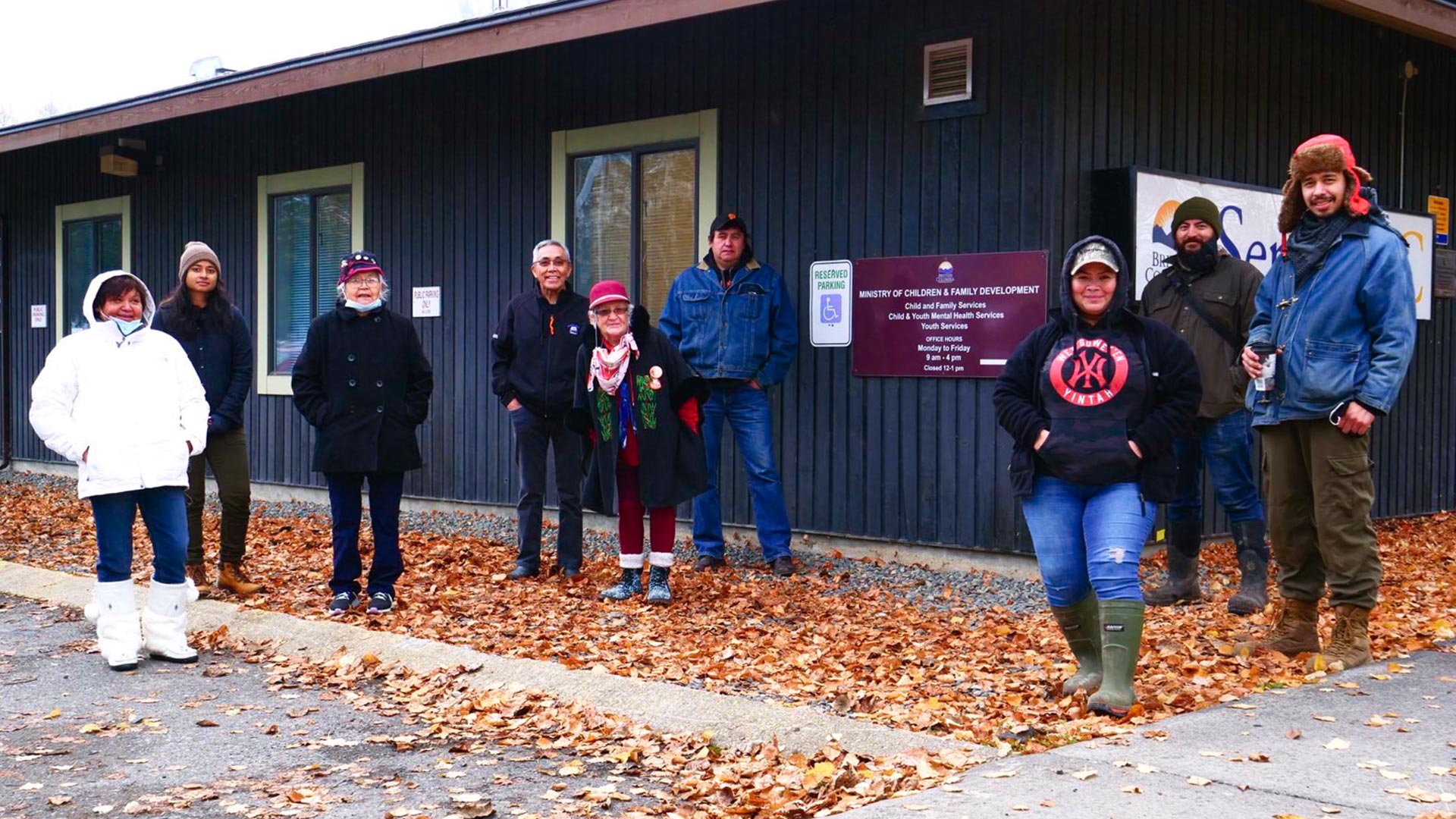
On Monday morning, Sutherland-Wilson says Gitxsan Nation members and allies — “including House Chiefs from other clans” — gathered outside of the MCFD office in Hazleton to send ministry workers a “a stern reminder that the community was watching them, and they’re waiting to see how they would respond to everything that happened since Saturday night.”
“We shared stories of our struggles and dealings with the system,” he says.
Due to the ongoing impacts of colonial policies and systemic racism, Indigenous children represent just over two-thirds of all kids in care in B.C., despite the fact that Indigenous kids only make up about 10 per cent of the total population of kids under 14 in B.C.
“There’s been a lot of talk,” Sutherland-Wilson says. “Talk is cheap. And I think there needs to be some serious overhauling of the system in general, as well as the relinquishment or transfer of powers to indigenous identities.”
On Jan. 1, 2020, the Act respecting First Nations, Inuit and Métis children, youth and families, also known as Bill C-92, came into force. Under the federal Act, there are two options for nations to exercise their jurisdiction over child and family service.
While dozens of Indigenous governing bodies have so far signalled their intent to exercise their jurisdiction under C-92, it appears Gitxsan governing bodies have yet to exercise legislative authority through this channel. (IndigiNews wasn’t able to get a comment from the Gitanmaax Band on this before deadline, and intends to follow up.)
“I can’t speak on behalf of the Gitanmaax,” says Sutherland-Wilson. “I know for our family … we stand on our inherent rights as a self-governing body whose title, jurisdiction and authority has never been formally extinguished by the Crown.”
“For us, it’s very straightforward. This young person belongs to our family, has a place within our community, has a role within our governance society, and is an absolutely cherished human being who carries on our legacy from ancient times.”
The ministry is supposed to have “measures in place to keep our youth in our communities and yet, this still happens here, this still happens everywhere, across all nations,” says Sutherland-Wilson.
He says he’d like to see the ministry conduct a “strict internal review of everything that led up to this point, to examine the the actions of every single one of their employees and care workers and everyone who is on this case, and to start identifying what steps were missed.”
“We’re here to take care of [our children]. We’re here to provide community love and culture,” he says. “We’re sick and tired of generation after generation being lost in the system and not knowing who they are and never coming home.”





